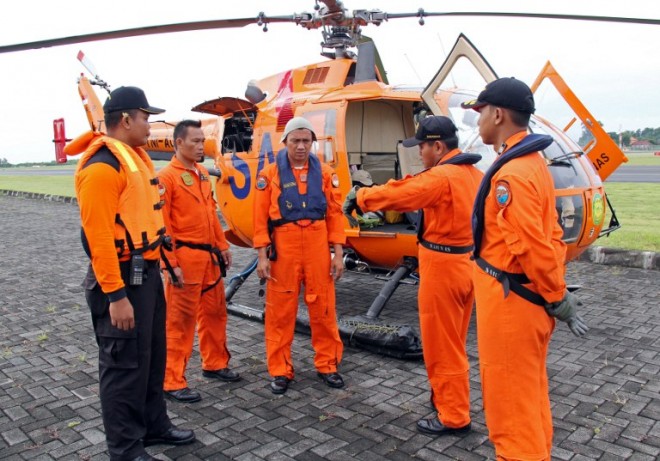Search for Japanese divers missing near Bali halted in darkness

This handout photo released by Indonesia’s national search and rescue agency on Sunday, Feb. 16, 2014. shows a rescue team preparing to search for seven Japanese tourists at Ngurah Rai Airport after they went missing during their third dive near the islands of Nusa Lembongan and Nusa Penida southeast of Bali on Feb. 14. Indonesian rescuers on February 16 resumed their search for seven Japanese scuba divers who vanished during a dive near Bali two days ago, a consular official said. AFP PHOTO/INDONESIA’S NATIONAL SEARCH AND RESCUE AGENCY
DENPASAR—Indonesian rescuers failed Sunday to find any trace of seven Japanese scuba divers who vanished off Bali two days ago, calling the search off until Monday as night fell.
A rescue team has been combing the seas for five tourists and two instructors—all women—since Friday afternoon, when the women went missing during their third dive of the day near the islands of Nusa Lembongan and Nusa Penida southeast of Bali.
Rescue officials complained that the business which provided the boat and skipper, Yellow Scuba, could not be contacted and this was hampering the search.
“We have not been able to contact Yellow Scuba. Usually we find out the details, like the color of the wetsuits and their tubes,” Bali province search and rescue chief Didi Hamzar told reporters.
“Without that detail, it’s very hard to know what you’re looking for.”
Yellow Scuba did not answer calls from AFP.
Hamzar said 15 official boats and a helicopter were being used in the search. His agency earlier said around 100 people were involved, including the maritime police, navy, fishermen and Japanese and Indonesian diving instructors.
“This is the third day that we have searched for the divers. We combed an area of around 200 kilometers (125 miles),” Hamzar said.
He said he had also sent search vessels towards the large island of Lombok to Bali’s east, in case the women were carried by a current that way.
Yasue Katsunobu, Japan’s deputy consul general in Bali, said the boat’s skipper called the police after the women failed to resurface from a dive.
The skipper said he was following the divers for some 20 minutes before a sudden downpour made the water cloudy, according to Japan’s Asahi Shimbun newspaper.
He moved his 10-meter-long boat to a point some hundreds of metres away where the divers were expected to resurface at an agreed time, the report said.
The skipper said he searched for them for an hour before reporting the incident.
“I’ve been guiding since 2009, and I’ve been to the area many times. Why did this happen?” he was quoted as saying.
Hamzar, however, said his agency had received information that the skipper said he had run out of fuel at one point and had to refuel before arriving at the agreed spot.
Rescuers had searched until 3 p.m. on Saturday when bad weather, including heavy rain, forced them to halt.
Hamzar said the women left from Blue Point on Nusa Lembongan, contrary to earlier police reports that they had left from Crystal Bay on neighboring Nusa Penida.
Popular dive site
Diving sites at both Both Blue Point and Crystal Bay are popular spots to watch the area’s famous mola-mola, or ocean sunfish. But they are recommended only for experienced divers because of strong currents, which often strike suddenly.
Crystal Bay was closed temporarily in August 2012 after a Danish man and Japanese woman died diving in the same week, according to reports.
Katsunobu said the seven women were very experienced scuba divers with at least 50 dives each under their belts.
Japan’s Kyodo news agency said the missing women were named by police and rescue authorities as: Ritsuko Miyata, 59, Emi Yamamoto, 33, Nahomi Tomita, 28, Aya Morizono, 27, Atsumi Yoshinobe, 29, Shoko Takahashi, 29, and Saori Furukawa, 27.
Bali is often pounded by heavy afternoon rain during the wet season, which lasts around six months of the year.
Nusa Lembongan and Nusa Penida are part of the Coral Triangle, widely considered the world’s richest underwater wilderness.
The Coral Triangle includes the waters of six nations in the Indian and Pacific oceans—Indonesia, Malaysia, the Philippines, East Timor, Papua New Guinea and the Solomon Islands.—Putra Wicaksana